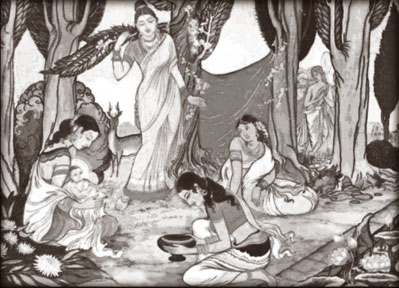Cultivating Metta in our lives
By Lionel Wijesiri
In our daily lives, we meet all kinds of people. Some are pleasant
and some are ill-disposed. We go through moments of anxiety, moments of
stress and circumstances which are perplexing. On encountering
unpleasant people, and in difficult times, a recital of the Karaniya
Metta Sutta will produce beneficial results. The practice of what it
contains will induce a tranquil state of mind, give us self-confidence
and help us overcome difficulties.
 |
|
The Buddha attained Parinibbana in a
most dignified manner through His meditative attainment.
Inset, after the Buddha attained Parinibbana, kings from
eight different kingdoms came to request for a share of the
Holy relics which would be worshipped by Buddhist followers. |
The Pali word Metta is a multi-significant term meaning
loving-kindness, friendliness, goodwill, benevolence, fellowship, amity,
concord, inoffensiveness and non-violence. True Metta is devoid of
self-interest. It evokes within a warm-hearted feeling of fellowship,
sympathy and love, which grow boundless with practice and overcome all
social, religious, racial, political and economic barriers. Developing
Metta is essential to doing away with the self-clinging that binds us to
suffering (Dukkha).
Scholars say the Karaniya Metta Sutta presents three ways to practise
Metta. The first is applying Metta to one’s day-to-day conduct. The
second is Metta meditation. The third is a commitment to embody Metta
with full body and mind. The third practice grows from the first two.
The common practice is to begin by offering Metta to oneself. Then
(over a period of time), Metta is offered to someone in trouble. Then to
a loved one, and so on, progressing to someone you don’t know well, to
someone you dislike, and eventually to all beings. Why begin with
yourself? Because so many of us struggle with doubts and self-loathing,
we must not leave ourselves out. Flower from within, for yourself and
for everyone.
Focus
Metta has the unique benefit of softening and expanding the heart.
When we practise Metta, we create the space to respond to life’s
vicissitudes with clarity, which helps us to choose wisely. When we
choose wisely, our lives are more harmonious. The quality of Metta
encourages us to meet all experience, regardless of whether it is
pleasant or unpleasant, with benevolent acceptance.
The Buddha said the proximate cause for unconditional love is the
recognition of the good qualities in ourselves and others. Every human
being is a constellation of qualities - pleasant and unpleasant, skilful
and unskilful. While it is healthy to open our hearts to all we see and
feel, we can choose where we place our intention.
When we focus on what we don’t like about ourselves and others, we
feed ill-will. How do we feel then, when we choose to focus on the good
in ourselves and others? How do those around us respond?
So, the cultivation of Metta begins with the intention to focus on
the good in all beings. Another way to help develop the quality of Metta
is to take the time to see and understand the perspectives of others. We
all experience our common reality from a variety of different angles.
The willingness to explore perspectives outside our own can help us
understand the motivations of those whose behaviour confuses or
threatens us.
The third way of cultivating Metta is to practise it as a meditation.
In the practice, there are four traditional phrases that help develop
the quality of Metta. These phrases are repeated silently to oneself
with the intention of reflecting on their meaning and their relationship
to the being to whom they are directed.
Quality
The Buddha called Metta “the limitless state”. There is nothing that
is outside its boundaries. With time and intention, the quality of Metta
begins to shift from the realm of effortful practice to a way of being.
Metta becomes our foundation; it becomes the gentle cradle within which
we hold all beings and all experiences, no matter how pleasant or
painful. It becomes our own divine abode.
What is the purpose of Metta practice?
As the legend is told, the Buddha first taught Metta to a group of
bhikkhus who were practising in a forest haunted by tree spirits.
 |
|
Siddhartha Gautama was born in Lumbini,
near the Nepalese-Indian border, to King Suddhodana, ruler
of the Sakya tribe, and Queen Mayadevi in 563 BC |
The bhikkhus were terrified and wanted to leave, but the Buddha sent
them straight back to the forest with instructions to cultivate Metta.
As the bhikkhus became skilled in Metta, the tree spirits stopped the
harassment and began to appreciate their presence, even serving the
bhikkhus during their retreat.
The Buddha taught Metta as a method for gladdening the mind, as a way
of strengthening concentration, as an offering of generosity, as a way
of meeting both verbal and physical abuse, as a way of overcoming fear,
and as a way of living in concord in community. Metta is a practice that
serves profound purposes.
Cultivating Metta
How do we cultivate loving kindness? Sit quietly. Feel your feet on
the floor, your contact with the seat. Sense the uprightness of your
spine. Let the posture be alert, but without excess tension. Gently
close your eyes, or gaze softly at a neutral spot on the floor, and take
a few deep breaths, feeling yourself sitting, letting go of thoughts
about past and future. Let the breath move through the heart centre,
warming you, nurturing you, and gently filling you with a sense of
well-being.
We begin the Metta practice by developing the ability to generate
loving kindness toward ourselves. Tune into a sense of yourself at your
best. Think of some aspect of yourself that you respect and like.
Imagine a situation when you helped others, when you acted from a place
of heart that cares. Let yourself rejoice in your own virtue, and begin
to silently repeat the phrases (compose three or four phrases that
resonate with you) directing the sense of well-wishing towards yourself.
We use ourselves as a kind of example, for we know we wish to be happy
and not suffer.
“May I be safe from danger! May I be happy! May I be healthy and
strong! May I have ease of well-being!”
After some time (perhaps 15 minutes), bring to mind someone who is
easy to care for. Someone who you feel gratitude towards, who you
respect, perhaps who has helped you, or a dear friend. Choose someone
endowed with virtuous qualities, worthy of admiration. Begin to repeat
the phrases of Metta for this virtuous person (another 10 or 15
minutes).
“May you be protected from inner and outer harm! May you be happy and
peaceful in mind! May you enjoy strength, vitality and health in body!
May you be blessed with ease of well-being in your social and material
relations.”
Let the meaning of the phrases deepen in your consciousness.
Contemplate the possibility of truly and simply wishing well. You can
continue to develop Metta using yourself and a friend in this way for
some time, allowing the stability of mind to deepen.
As the Metta grows clearer and stronger, it is possible to bring to
mind more challenging people, those whom we may have some conflict with,
offering the very same wishes of happiness for them.
Let the practice develop slowly. Little by little, phrase by phrase,
day after day, our hearts will incline towards full-hearted care for all
of life. Metta is the intention of goodwill. It is known through the
clear absence of ill-will, resentment and selfishness in the mind.
Metta is not limited to reciting “May you be happy”; it is not a
magical incantation. We use the phrases merely to remind ourselves of
the deepest truths of love and connection. Metta is more pervasive and
more natural than any words could express. Words are only pointers to
the deep natural capacity of the human heart to abide in pure and
complete love. |


